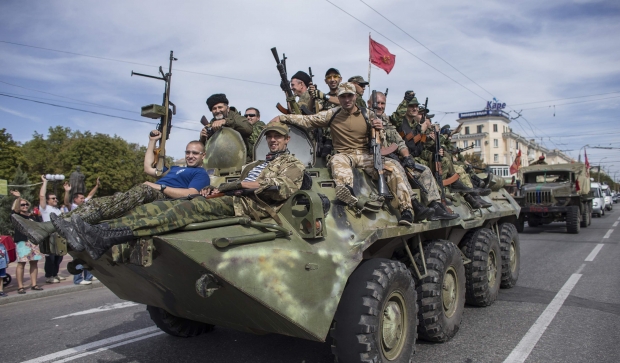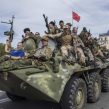
Central Asians Fighting in Ukraine May Lead to Tensions With Russia
Publication: Eurasia Daily Monitor Volume: 12 Issue: 56
By:

On March 17, the Russian and Kyrgyzstani services of Radio Free Europe/Radio Liberty (RFE/RL) published a long interview with a citizen of Kyrgyzstan identified as Manas (not his real name), who said he had fought alongside the Moscow-backed pro-Russia separatists in the Luhansk region of eastern Ukraine. A retired officer and former graduate of the Simferopol High Military and Political Academy in Crimea, the man affirmed that he decided to leave for Donbas (eastern Ukrainian region encompassing Luhansk and Donetsk provinces) last August after watching reports on Russian TV about so-called “fascists” and “Nazis” terrorizing people in Ukraine. Manas subsequently grew disillusioned with the way the war was waged by the separatists, saying he had reached a tipping point after first seeing regular Russian troops on Ukrainian soil. “They are not conscripts, but well-trained military units, which are normally based in South Ossetia and already got their feet wet in the First and Second Chechen Wars,” he told journalists (Svoboda.org, Rus.azattyk.org, March 17).
Manas’s conclusion that “there are no fascists in Ukraine” is hardly surprising, given to what lengths the Kremlin has pushed its propaganda war against Kyiv government in order to justify its barely masked intervention in the neighboring country. The new element in this story is, however, further evidence (see EDM, July 25, 2014) of the explicit involvement of Central Asians in a war they do not own and that has little or no direct impact on their respective countries. According to Manas, he met another 17 Kyrgyzstanis among the foreign combatants recruited by Luhansk separatists; the head of his reconnaissance unit was an ethnic Kazakh from the Russian city of Kaliningrad. In his words, this group also comprised “Serbs, Chechens, Kazakhs and Ossetians.” On March 18, Kyrgyzstan’s National Security Committee (GKNB) firmly denied the presence of Kyrgyzstani nationals on either of the warring sides in Ukraine, calling the RFE/RL interview a “provocation” (vesti.kg, unian.net, March 18).
Yet, the former chair of the GKNB, Artur Medetbekov, holds a different opinion. “There are about two dozen Kyrgyzstani citizens fighting in Ukraine,” he told Vesti.kg last week. “As far as I know, two of them died and were buried at home.” Medetbekov alleged that the main cause of their departure to Donbas was economic hardship. Earlier this year, Tajikistan officially recognized the participation of its own citizens in the Ukrainian conflict. On January 8, the regional prosecutor’s office of Khatlon province, in southern Tajikistan, told the media that Murodali Barfiyev, from Kurgan-Tyube (located 80 kilometers south of Dushanbe), had been killed in eastern Ukraine while fighting with the rebels. In early December 2014, a Russian news portal, 36on.ru, had published an interview with a Tajikistani fighter called Talib, according to whom, “there are many Tajiks who came voluntarily to Ukraine” to support Russia. Three weeks later, Tajikistan’s embassy in Kyiv issued a statement saying that such information “did not correspond to the reality” (Vesti.kg, March 18; Interfax-Ukraine, January 8; News.tj, December 23, 2014; 36on.ru, December 4, 2014).
While credible reports about the presence of either Uzbekistani or Turkmenistani passport holders in Donetsk and Lunansk provinces have been scarce, Russia’s key ally in Central Asia, Kazakhstan, was rumored to provide volunteers to the incipient rebel movement as early as February 2014, while Viktor Yanukovych was still president (see EDM, August 11, 2014). Later, in July 2014, the then-commander of the pro-government Donbas battalion, Semen Semenchenko claimed that security officials from both Russia and Kazakhstan “had been honing their skills” in eastern Ukraine “just like the Americans during the Vietnam War.” At the time, Semenchenko estimated that the separatists were paying foreign fighters between $500 and $1,000 a day for their “work,” depending on whether or not they engaged in active combat. A few weeks before, Kazakhstan’s Ministry of Foreign Affairs had already promised to verify similar allegations put forward by the “foreign media” (Uralsweek.kz, July 8, 2014; Ktk.kz, June 16, 2014).
Last October, a major Kazakhstani TV channel spoke to a 26-year-old Kazakh, Nurlan Igenov from the northern industrial city of Ekibastuz, who reportedly went to eastern Ukraine to work as a war correspondent, shooting videos for separatists. The same month, the Prosecutor General’s Office of Kazakhstan released a short statement confirming “reports about individual citizens traveling to the southeast of Ukraine to take part in the armed conflict.” In December 2014, however, it backtracked on its earlier declaration, with Deputy Prosecutor General Andrey Kravchenko publicly saying that “our Ukrainian colleagues have not confirmed the participation of any Kazakhstanis in the fighting.” Meanwhile, local media reported on December 19 that Evgeni Vdovenko, a Kazakhstani citizen of Slavic origin, had nonetheless been sentenced to a five-year prison term for having fought in Ukraine. The man confessed he had been in touch with Russia-based “recruiters” from Rostov-on-Don who had later helped him cross the border to the Ukrainian city of Krasnodon, 51 km southeast of Luhansk (Vestnik Kavkaza, December 19, 2014; Tengrinews.kz, December 18, 2014; Prokuror.gov.kz, October 30, 2014).
Apparently, Russia and the Moscow-backed separatists are eager to use any human resources they can find to pursue their war against Kyiv, regardless of whether they hail from Central Asia, the Caucasus or even the Balkans. It also appears that while Central Asians are present in Donbas, they are far from numerous and are mostly driven by financial need, with only a small fraction of them having been brainwashed by Russian propaganda. However sporadic and limited in scope, Moscow’s resort to using foreign fighters in the Donbas war zone is unlikely to sit well with local governments, especially that of Kazakhstan where ethnic Russians still account for over 23 percent of the total population. This could well become another point of contention at a time when Russia is desperately seeking to consolidate its influence throughout the post-Soviet space against the backdrop of a flagging economy and dwindling credibility abroad.




